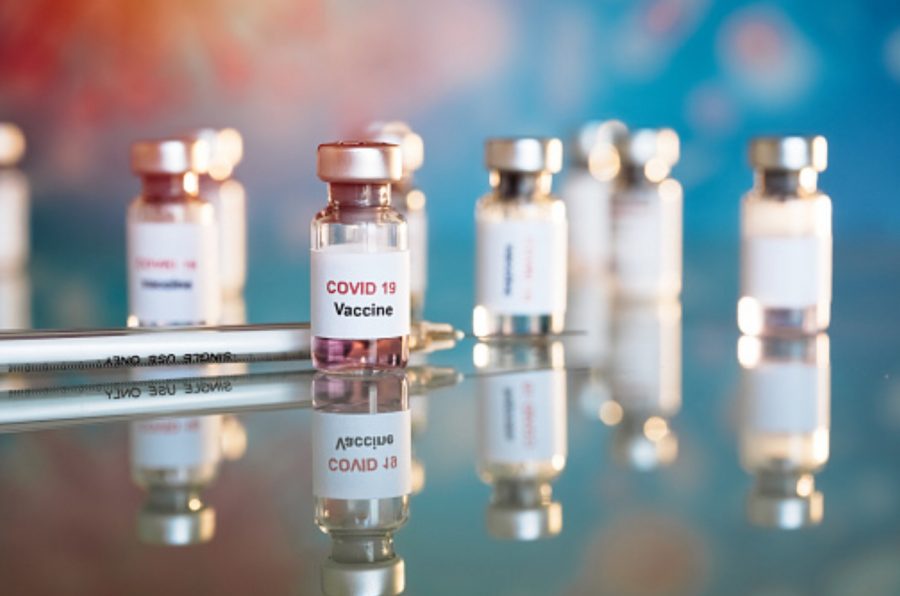A Conversation with Biology Teacher, Ms. Eichler
Nearly nine months have passed since the first Coronavirus death was reported in the United States. All the while, scientists and doctors have been working relentlessly to create a new vaccination. As death tolls continue to rise and schools move to remote learning, many Americans have been left wondering when the vaccine will be widely available.
According to the CDC, Pfizer’s COVID-19 vaccine received a recommendation that the FDA authorize it for emergency use. Clinical trials are currently being conducted, and the first doses are expected to be administered during the week of December 14, 2020.
Ms. Heidi Eichler, a biology teacher at Regina Dominican High School, is passionate about new developments in the health field. To learn more about the progression of the COVID-19 vaccine, I got the chance to ask Ms. Eichler a few questions.
What happens inside the body when a person is vaccinated?
“When you are vaccinated, you are given a weakened or killed form of the virus. Having this in your body basically primes your immune system. The immune system recognizes the foreign substance (viral proteins) and develops antibodies to it. Antibodies then circulate in your bloodstream. If you are exposed to the virus after that, the antibodies can bind it, alert the white blood cells, and destroy the virus before it can really infect your cells. It’s the same sort of thing that happens when you actually get a viral disease and recover from it (that’s why they’ve been interested in getting plasma and other samples from people who have recovered from COVID-19; to get antibodies from their bloodstream to possibly treat other victims). Basically, vaccines are a way to train your immune system to recognize possible viral threats and shut them down before they make you sick.”
What risks are associated with taking a new vaccine?
“With any vaccine, there is always the risk of side effects or reactions. A lot of vaccines are developed for distribution by incubating them in chicken eggs; if someone has an allergy to eggs, they may also have an allergic reaction to the vaccine (a good thing about the mRNA vaccines that have been developed is this probably is less likely). Also, since the vaccine activates and primes your immune system, you may see some of the symptoms of an infection (e.g. a mild fever). For most people, these symptoms are very mild, but some people do have more severe responses to vaccines. With a new vaccine, there are a couple of specific concerns. One involves the efficacy (the effectiveness) of the vaccine against the disease. The polio vaccine has been around for over 60 years and millions of people have gotten it; we know that it works. The COVID-19 vaccines have been through trials but we don’t have as much data available on it. Another concern is safety. New drugs and treatments (including vaccines) go through many levels of testing to ensure they aren’t likely to cause more serious side effects. The COVID-19 vaccines have been developed very quickly, so, again, there isn’t as much data as we have for other vaccines. When you hear about the anti-vax movement and the concerns they raise, those aren’t actually supported by science or evidence. For instance, one of the biggest claims is that there is a link between vaccines and autism. This is largely based on a preservative called thiomersal; it was used in vaccines in the past but has not been widely used in decades. Also, the one study about its link to autism was disproven long ago; and the doctor who published it since admitted he falsified data and he lost his medical license.”
What causes differences in vaccine efficacy?
“The main reason we see differences in vaccine efficacy is due to differences among people, specifically among their immune systems. Vaccines don’t fight off or kill the pathogens directly (unlike, say, antibiotics, which act themselves to kill bacteria); vaccines help prepare and “teach” our immune systems. Since every person is a little bit different from every other person, each immune system responds just a tiny bit differently to each vaccine. Another big reason is due to the virus itself. Viruses can evolve (change), so there are slight genetic differences among different strains and different individual particles, just like there are differences among people. Some may be slightly more resistant than others.”
Any other thoughts about all this?
“I think that the development of these COVID-19 vaccines is an amazing scientific achievement. We have seen more innovation and cooperation around the world than maybe any other time in human history; it’s really incredible and inspiring. Also, I think there’s a good chance that COVID vaccines will become an annual thing, like getting vaccinated for the flu. It will just become a part of our usual health maintenance routine.”


